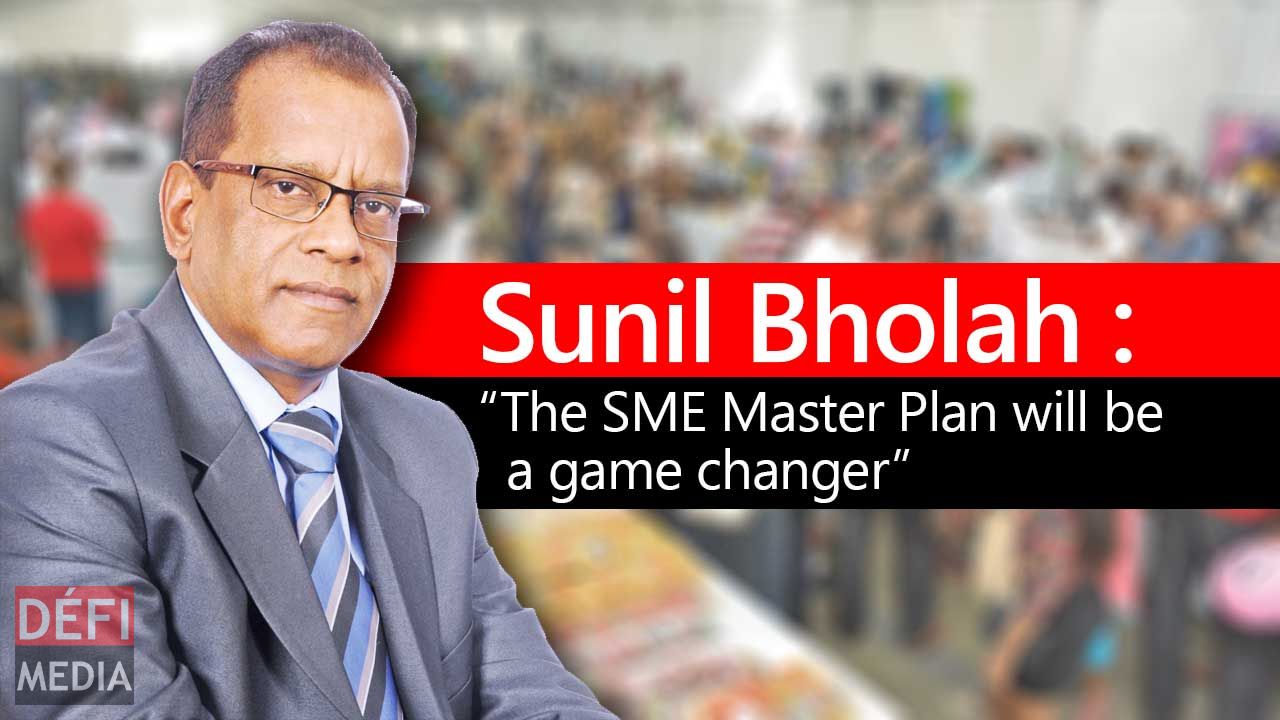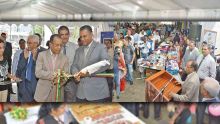
The Small and Medium Enterprises Development Authority (SMEDA) launched the SME Fair at the Caudan Waterfront on Thursday 3 November 2016. News on Sunday took the opportunity to ask a few questions to Sunil Bholah, the Minister of Business, Enterprises and Cooperatives. Among other things, he announces the International SME Technology Fair to be held in May 2017.
Publicité
What is the main strategy behind the organisation of the SME Fair?
The primary objective of the fair is to raise awareness about the know-how of local SMEs, and, hence, increase the visibility of locally-manufactured products. Access to markets is one of the recurrent problems facing entrepreneurs and such an event enables SMEs to showcase their products, launch new products, create or strengthen partnerships with clients and better capture their aspirations. About 75 SMEs operating in activities such as gents & ladies wear, beachwear, kids wear, footwear/leather products, fashion jewellery, wood and furniture, plants, handicraft, soap and detergents and other value-added products and services are participating in this fair.
What are the new structures put in place for the promotion of SMEs since you took office as Minister and the progress made?
Our very first initiative was to set up MyBiz, the SME one-stop shop, with the aim of providing an innovative solution to the administrative hassle of new and existing enterprises. However, a number of organisations which deliver specific permits have still not signed the Service Level Agreements that are supposed to formalise their commitment to working hand in hand with MyBiz. Thus, there are still some weak spots at this level but rest assured that I devote a lot of my time to MyBiz and SMEDA, ensuring that appropriate actions are taken.
We will soon be coming up with a 10-year Master Plan for SMEs which will be the common thread that will formally define government’s policy. It will mark a new beginning for the sector – a new beginning for greater heights. I am confident that the SME Master Plan will be the ‘game changer’ in navigating the new development path for our SMEs across all sectors until 2025.
A network of Business Development and Facilitation Centres, commonly known as incubators, is being set up in four regions of the island as we want to spur knowledge based enterprise development, by providing opportunities for knowledge transfer and support services to entrepreneurs. Three of those structures are already operational, in Mahebourg, Bel Air and Coromandel. The fourth one will soon open in Goodlands. We have signed MoUs with ACCA and Microsoft so as to give entrepreneurs the opportunity to benefit from the expertise of such prestigious organisations through those incubators.
A Handicraft Training Academy, which includes a Craft Lab, has also been set up in Coromandel as part of a plan to revive local handicraft. It is a common facility centre which serves as a central point of design and production resources for local artisans and which houses current information of design trends, markets, raw materials, and production methods.
The government is also coming up with two new SME parks to provide space to entrepreneurs. They will be located in Plaine Magnien and Vuillemin. On top of such permanent structures, it is also worth noting that we will be organising an International SME Technology Fair in May 2017. Given the limited R&D and technology base in Mauritius, it is difficult and costly to develop most technologies domestically, and a reasonable approach would be to acquire or license technologies from more advanced countries. It is in this perspective that we are organising this fair – this B2B event will create the most effective linkages between several foreign technology providers and local businesses to facilitate technology transfer and absorption from one end to another.
Budget 2016-2017 has earmarked financial assistance for SMEs. How far the Budget is being used to help for the setting up of new SMEs?
It is true that prior to Budget 2016-2017, there was a lack of attractive financial mechanisms to encourage people, particularly youngsters, to become entrepreneurs. The last Budget has involved the DBM, which has devised its Micro Credit Scheme, thus enabling micro-enterprises to benefit from loans of up to Rs 250,000 at a rate of 6%. The SME Financing Scheme is being continued for another three years and has been extended to individual entrepreneurs as well. The interest rate under this scheme has been brought down from 7.4% to 6%.
All parties concerned are working towards the finalisation of the Leasing Equipment Modernisation Scheme, which will provide greater access to leasing finance, and the setting up of a SME Equity Support Fund, which results from a merger between NRF and the SME Partnership Fund. It is also expected that the mechanism to enable SMEs to get access to factoring services will be finalised very soon.
Once these procedures are completed, local entrepreneurs will have an eco-system which will provide them with a wide array of financial mechanisms that are more adapted to their needs.
Up to now, how many jobs have been created through SMEs?
The SME sector is the largest employer in Mauritius. There are more than 108,000 SMEs, which employ about 250,000 to 280,000 people – that is around 54.6 per cent of the total labour force. Since the inception of MyBiz, 129 projects have been approved and submitted to MauBank for consideration. These 129 projects represent about 1,090 jobs.
Where is the vision of making SMEs the fourth pillar of our economy? Is it far, approaching rapidly or not accessible?
The objective of the government is to transform Mauritius into a forward looking, economically vibrant and innovative country and the SME sector has been clearly positioned from the very outset as the future engine of economic growth. Since the very beginning of this government’s mandate, my Ministry has been working relentlessly to take up the considerable challenge of revamping the SME sector and igniting the spirit of entrepreneurship among our fellow countrymen. And it is obvious that things at this level cannot move forward without the formulation of policies and the design of tools targeted towards the achievement of one major condition: the improvement the business environment.
In this new era of doing business, there are important challenges that I have noticed and that need to be tackled. They are, among others:
- Skills – there are mismatches between the skills supplied by our education system and the skills enterprises seek, leading to the paradoxical situation of high rates of unemployment among young graduates persisting alongside complaints by SME owners of a shortage of workers with specific skills.
- Limited innovation – when compared with upper middle income countries that have similar population size such as Iceland and Cyprus, Mauritius is underperforming and is ranked 78th in the innovation ranking of the 2015-16 global competitiveness index.
We need to devise the appropriate mechanisms to support the creation of an ecosystem which is conducive to the sustainable development of our enterprises. Our policies can be more effective and entrepreneur-centric in the long run. The priority areas that can spur the business environment to another level include the need to create technology transfer platforms, the importance of R&D, prompting a culture of innovation among entrepreneurs and developing the exportability of Mauritian enterprises, among others.

Notre service WhatsApp. Vous êtes témoins d`un événement d`actualité ou d`une scène insolite? Envoyez-nous vos photos ou vidéos sur le 5 259 82 00 !

























![[SATIRIQUEMENT VOTRE] Anabelle et l’art de la « punchline-choc »](https://defimedia.info/sites/default/files/styles/square_thumbnail/public/anabelle_ok.jpg?itok=4Z-eqHVn)
![[Satiriquement Vôtre] Pentiah et l’effet « Ice Balling »](https://defimedia.info/sites/default/files/styles/square_thumbnail/public/penthiah_thumb.jpg?itok=dV6Ma2sE)
![[Satiriquement Vôtre] AGG, l’alchimiste des ondes](https://defimedia.info/sites/default/files/styles/square_thumbnail/public/agg.jpg?itok=upwoCqN0)
![[Satiriquement Vôtre] Gungapersad coupe le Réseau des ados](https://defimedia.info/sites/default/files/styles/square_thumbnail/public/mahend_thumb.jpg?itok=ee0qxT4O)
![[Satiriquement Vôtre] Shirin, la dompteuse de l’hémicycle](https://defimedia.info/sites/default/files/styles/square_thumbnail/public/satiriquement_shrin.jpg?itok=W12WttMf)
![[Satiriquement Vôtre] Gunness inaugure... avec zéro effort](https://defimedia.info/sites/default/files/styles/square_thumbnail/public/gunesss_thumb.jpg?itok=tsiVLtDW)
![[Satiriquement Vôtre] Quand le « Messie » devient un mirage](https://defimedia.info/sites/default/files/styles/square_thumbnail/public/messie_thumb.jpg?itok=3dlw2jEh)